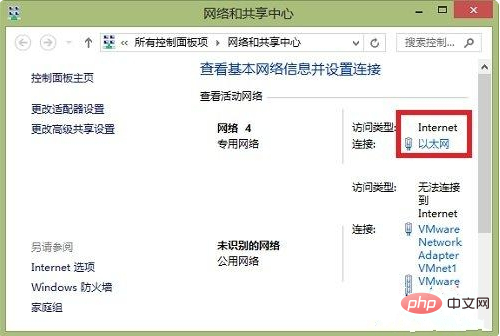What is the difference between Ethernet and Broadband
The difference between Ethernet and broadband: 1. Ethernet refers to the baseband LAN specification created by Xerox and jointly developed by Xerox, Intel and DEC; 2. The access method of wired broadband is already similar to Ethernet is connected.

#The operating environment of this article: Windows 7 system, Dell G3 computer.
The difference between Ethernet and broadband:
1. Ethernet: refers to the baseband LAN created by Xerox and jointly developed by Xerox, Intel and DEC Specification is the most common communication protocol standard used in existing local area networks today. Ethernet uses CSMA/CD (Carrier Sense Multiple Access and Collision Detection) technology and runs on multiple types of cables at a rate of 10M/S. Ethernet is similar to the IEEE802.3 series of standards.
2. Wired broadband: The access method of wired broadband is similar to Ethernet access. In terms of stability, it is much stronger than ADSL, which is an asymmetric digital subscriber line. Although the access is a public network dynamic IP, it is still limited by the operator's public network export speed.
Ethernet is the most common communication protocol standard used in existing local area networks today. This standard defines the cable types and signal processing methods used in local area networks (LANs). Ethernet carries packets of information between interconnected devices at a rate of 10-100Mbps. Ethernet may operate in two modes, half-duplex and full-duplex.
Broadband is actually not strictly defined. Generally, the current upper limit of dial-up Internet speed is 56Kbps as the demarcation. Access methods of 56Kbps and below are called "narrowband", and access methods above are classified as "narrowband". Similar to "broadband". If there must be a definition, it is the bandwidth required for the transmission of various media on the network that can be felt by people's senses. Therefore, it is also a dynamic and developing concept. For ordinary home users, current broadband refers to non-dial-up access network infrastructure and services with a transmission rate exceeding 1M (1M=1024KB) and enabling 24-hour connection.

Extended information
Cable broadband speed
Many people are worried that the bandwidth of Cable Modem is shared, in case the number of people accessing the Internet If it is too high, the speed will decrease. Here we explain it from different perspectives, including technology and trends, to help you understand how large the bandwidth of Cable Modem is. As mentioned before, Cable Modem can produce a bandwidth of 27 M/36 Mbps on a single cable TV channel using different modulation techniques, which is equivalent to the bandwidth of 16-22 ADSL dedicated lines. Based on the bandwidth on each Cable channel and the number of users surfing the Internet on this channel at the same time, we can calculate the average bandwidth that each person can feel.
The reason why "feeling" is used here is because the bandwidth of Cable Modem is the same as Ethernet0 and is shared by all users. The estimation method of the bandwidth available to each person on a shared media (Shared Media) is estimated using a model called "statistical multiplexing". When other users do not make large transmissions, users Almost all the bandwidth can be enjoyed exclusively, which is why cable modem users can often enjoy ultra-high speeds. It is estimated that each broadband Internet user can enjoy an average speed of 200-500 Kbps, with the fastest being 1500 Kbps (equivalent to The transmission speed of an ADSL dedicated line). In the future network development, when the transmission speed reaches more than 1Gbps, the average speed that each user can enjoy will be more than 2Mpbs.
The above is the detailed content of What is the difference between Ethernet and Broadband. For more information, please follow other related articles on the PHP Chinese website!

Hot AI Tools

Undresser.AI Undress
AI-powered app for creating realistic nude photos

AI Clothes Remover
Online AI tool for removing clothes from photos.

Undress AI Tool
Undress images for free

Clothoff.io
AI clothes remover

AI Hentai Generator
Generate AI Hentai for free.

Hot Article

Hot Tools

Notepad++7.3.1
Easy-to-use and free code editor

SublimeText3 Chinese version
Chinese version, very easy to use

Zend Studio 13.0.1
Powerful PHP integrated development environment

Dreamweaver CS6
Visual web development tools

SublimeText3 Mac version
God-level code editing software (SublimeText3)

Hot Topics
 1377
1377
 52
52
 Win10 Ethernet Enable DHCP Repair Method Guide
Dec 30, 2023 pm 02:23 PM
Win10 Ethernet Enable DHCP Repair Method Guide
Dec 30, 2023 pm 02:23 PM
What happens when Windows 10 Ethernet prompts that dhcp is not enabled? Recently, some users have encountered such a problem when using computers. In order to help everyone use the network better, the editor will share the solution to the problem that Windows 10 Ethernet prompts that dhcp is not enabled. How to fix dhcp not enabled on win10 Ethernet: 1. First press the shortcut key "win+r", and then click run. 2. Then enter services.msc and press Enter. 3. Then you can find the "DHCPClient" service and double-click it to open it. 4. Finally, change the activation type to automatic and the service status to started, then press OK to save the settings and restart the local connection.
 What is the actual speed of 600m broadband?
Mar 15, 2023 pm 02:57 PM
What is the actual speed of 600m broadband?
Mar 15, 2023 pm 02:57 PM
The actual network speed of 600m broadband is about 60M-70M per second. 600M refers to 600 megabits (Mpbs) broadband, converted into data transmission speed in bytes: 1Mbps=1/8MBps, then the download speed of 600 megabits broadband is "600÷8=75MB/s", that is, per second 75MB download speed; but this data is only a theoretical download speed. In fact, broadband download speed is affected by many factors, such as router network transmission channel and network delay issues. Generally, the actual network speed is around 60M-70M per second.
 How to enable Ethernet disabling in win10: Detailed steps
Jan 03, 2024 pm 09:51 PM
How to enable Ethernet disabling in win10: Detailed steps
Jan 03, 2024 pm 09:51 PM
Friends who use win10 system often ask how to enable Ethernet disabling. In fact, this operation is very simple. You need to enter the network settings to perform it. Next, I will take you to take a look. How to disable Ethernet in win10: 1. First, click the network connection icon in the lower right corner to open the network and Internet settings. 2. Then click on Ethernet. 3. Then click "Change Adapter Options". 4. At this point, you can right-click "Ethernet" and select Disable.
 What is the uplink and downlink of 1000M broadband?
Oct 28, 2022 am 11:02 AM
What is the uplink and downlink of 1000M broadband?
Oct 28, 2022 am 11:02 AM
The downlink rate of 1000M broadband is 1000 Mbps, and the uplink rate is 30 Mbps; but to be precise, the uplink rate is not certain, because ordinary users have limited uplink rates, which are related to the local operator who handles the broadband; generally, if it is dedicated line broadband, Then the uplink rate and downlink rate are equal.
 200mbps is how many megabits of broadband?
Mar 20, 2023 pm 02:21 PM
200mbps is how many megabits of broadband?
Mar 20, 2023 pm 02:21 PM
200mbps is 200 megabit broadband. The so-called broadband 200Mbit actually means that the broadband access rate is 200Mbit; because "1Mbps = 1024kbps = 1024/8 KBps = 128KB/s", if converted, the download speed of 200M broadband is: "200 * 128 KB/ s = 25600 KB/s = 25600 / 1024 MB/s = 25.6MB/s”.
 How to fix LAN Ethernet driver issues in Windows 11/10
Feb 19, 2024 pm 08:51 PM
How to fix LAN Ethernet driver issues in Windows 11/10
Feb 19, 2024 pm 08:51 PM
If you encounter problems with the LAN Ethernet driver on Windows PC, this article will guide you to solve these problems. Many Windows users have reported that their Ethernet drivers stopped working. This could be due to various reasons such as outdated/faulty drivers, incorrect network configuration, defective network adapters, etc. How to Fix LAN Ethernet Driver Issues in Windows 11/10 If your LAN or Ethernet driver is not working properly on Windows 11/10, you can follow some standard troubleshooting practices to resolve the issue. Update your Ethernet driver. Automatically or manually reinstall the Ethernet driver. Enable your Ethernet adapter. reset your
 How many megabytes of broadband is 30mb/s?
Mar 20, 2023 am 11:18 AM
How many megabytes of broadband is 30mb/s?
Mar 20, 2023 am 11:18 AM
30mb/s is approximately 240 megabytes of broadband, and the conversion formula is "30MB/Sx8=240M"; usually the megabyte of file size refers to 4MByte; byte (Byte) is a measurement used by computer information technology to measure storage capacity. Units that also represent data types and language characters in some computer programming languages.
 How to solve the problem of missing network card in win10?
Dec 22, 2023 pm 02:15 PM
How to solve the problem of missing network card in win10?
Dec 22, 2023 pm 02:15 PM
We often find that when we turn on the computer, the Ethernet of win10 is missing. This is a common computer problem. So how do we solve it? Next, the editor will teach you how to solve this small problem. What to do if the Ethernet is missing in win10? Step 1: Open the Device Manager, first select "Network Adapters", then select "Action, Add Obsolete Hardware (L)". Step 2: Select the option in the red box and click Next. Step 3: Select the network adapter and click Next. Step 4: Select Microsoft on the left, select "Loopback Adapter" on the right, and click Next. Step 5: Finally restart the computer and the Ethernet will come out.



